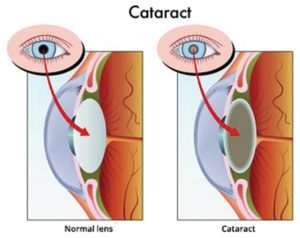By Duane Wiggins, M.D.
Board Certified Ophthalmologist Cataract & Refractive Surgeon Quigley Eye Specialists
 If your vision is becoming blurry, if it’s difficult to drive at night or if bright colors are turning dull, you might have cataracts. With age or disease, the lens in your eye, may become cloudy or dark. If that’s the case, then you should consider surgery to remove the cataracts and replace them with comfortable artificial lenses that can give you clearer vision.
If your vision is becoming blurry, if it’s difficult to drive at night or if bright colors are turning dull, you might have cataracts. With age or disease, the lens in your eye, may become cloudy or dark. If that’s the case, then you should consider surgery to remove the cataracts and replace them with comfortable artificial lenses that can give you clearer vision.
In the past, many physicians advised waiting for cataracts to “ripen” before undergoing surgery. But thanks to advancements in surgical technique, including the use of laser and computer-assisted surgery, cataracts can now be removed smoothly and safely whenever they interfere with your daily life. In fact, the overall national success rate is 98 percent or higher among the 3 million Americans who have cataract surgery each year, according to a recent report from the American Society of Cataracts and Refractive Surgery. And at Quigley Eye Specialists, the success rate is even better than the national average.
Cataracts typically begin to affect people in their 50s, 60s or 70s. The symptoms include blurry vision, difficulty focusing on small details, excessive glare, and loss of depth perception. Certain genetic disorders, some types of medications or traumatic injuries may cause cataracts to occur earlier in life. Cataracts may progress swiftly or slowly, causing vision problems in just a few months, or be relatively unchanged for several years.
When you schedule an evaluation at Quigley Eye Specialists, either an ophthalmologist or optometric physician can detect cataracts in an annual vision examination. It’s important to have your eyes checked regularly because some vision problems, like glaucoma and macular degeneration may not be as evident as cataracts.
If you do have cataracts, one of the first questions to ask yourself is simple: “Am I having any problems with my vision?” If the answer is no, then there is no reason to have cataract surgery at this time. Instead, you should pay attention to your vision, have regular checkups and talk to your eye professional if problems occur in the future.
If your vision is affecting your daily life, making it difficult to work, read a book, watch TV or drive, then it’s time to think about cataract surgery and correct those limitations.
Before undergoing surgery, you should have a comprehensive examination from the front surface of the eye all the way to the retina at the back of the eye. This can identify other potential vision problems that may need to be addressed before or after your cataracts.
Another issue to consider involves the new lens that will be placed in your eyes after the cataracts are removed. For instance, you might want two lenses that complement each other, giving you good long-distance and intermediate and/or near vision. If you spend time outdoors playing golf or going boating, and also use your smart phone, for example, you could enjoy those activities without wearing glasses.
Alternatively, you could get lenses for intermediate and close-up vision, or two lenses with the same types of distance correction. In any case, the brain has an innate ability to combine the images from each eye into one clear vision.
The cataract surgery itself is done on an outpatient basis, usually one eye at a time. This gives you time to recover from the procedure or address any issues that may arise. It also allows you to get used to the new lens in one eye, and may help you decide on a lens for the second eye. Most patients can see much better just a day or two after surgery
If cataracts are causing problems, schedule an appointment with Quigley Eye Specialists to restore your vision and improve your quality of life.
Duane Wiggins, M.D. specializes in cataract surgery, LASIK surgery and general ophthalmology at Quigley Eye Specialists. He has performed thousands of cataract and laser procedures, and is the proud recipient of the TLC Laser Vision Milestone Award as well as other awards.
About Quigley Eye Specialists
Technology leaders in eye care and one of the nation’s leading multispecialty ophthalmology practices, Quigley Eye Specialists creates patients for life by providing the highest level of quality eye care and service to the community. We accomplish this through our caring staff, our skilled medical team, and by using the most advanced technology to help ensure every patient’s best possible vision.
Quigley Eye Specialists has eight convenient locations in Fort Myers, Cape Coral, Naples, Bonita Springs, Port Charlotte, Lehigh Acres and Punta Gorda. For more information, call 239-466-2020 or visit www.quigleyeye.com.
Quigley Eye Specialists
675 Piper Blvd
Naples, FL 34110
239-466-2020
www.quigleyeye.com










